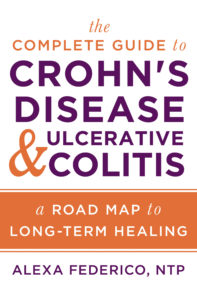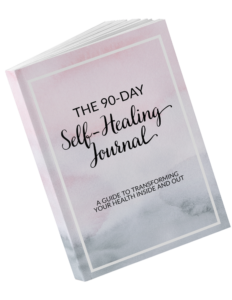Inflammatory bowel disease (IBD) is an autoimmune disease characterized by chronic inflammation of the gastrointestinal (GI) tract. The prevalence of IBD is on the rise. Why is this? Well, no single cause has been determined. Something triggers the immune response to go into overdrive. Signs point to a combination of genetics, diet, and lifestyle.
The Difference between Crohn’s Disease and Ulcerative Colitis
Although Crohn’s and ulcerative colitis are both forms of IBD, Crohn’s affects the entire digestive tract and ulcerative colitis only affects the colon. These diseases are different from IBS in that IBS is not autoimmune in nature.
There are various risk factors for developing IBD. Just remember, having a risk factor does not give you the disease. Some include: being caucasian (especially being of Ashkenazi Jewish descent), having IBD run in your family (genetics accounts for 1/3 of autoimmune risk factor), smoking cigarettes (not good for anyone!), overuse of non-steroidal anti-inflammatory drugs (NSAIDs), and living in an industrialized country.
Signs may vary and can appear outside of the GI tract. Possible symptoms include:
- Diarrhea
- Constipation
- Weight loss
- Rectal bleeding/blood in stool
- Mouth sores
- Joint pain
- Abdominal pain
- Night sweats
- Fatigue
- Nausea
- Vomiting
- Fever
- Loss of menstrual cycle
- Loss of appetite or feeling full easily
I personally experienced most of these symptoms before I was diagnosed. I had no idea that my mouth sores, knee pain, or night sweats were related to my stomachaches. The body shows us signs in very interesting ways!
Are you struggling with your IBD? Book a free call and let’s talk about how I can help you.Schedule Appointment
Options for Treatment
Every person with IBD is a unique situation. No body chemistry is the same. Therefore, not every treatment plan will work the same for everyone.
When I began my IBD journey, I first tried Pentasa and then Asacol, but I stopped both after not seeing results. Prednisone helped me for some time, but stopped working after a while. (Prednisone is a steroid used for short-term, anyway).
New drugs are continuing to be made and tested. I hope with increased technology and resources that they are more effective at helping people reach remission along with fewer side affects.
The goals in treating IBD are to:
- Heal the inflammation of the bowel wall to eliminate symptoms
- Prevent additional bowel damage that could lead to more severe complications
- Improve quality of life
These goals go in order of how to address them. If inflammation is healed, symptoms will resolve themselves and a person’s quality of life will be improved. I have personally experienced better quality of life with a combined healing protocol. If that isn’t motivation to get better, what is?
Previously, conventional medicine had started with multiple rounds of steroids and the lowest-risk medications (as I went through), and doctors would work their way up to more aggressive treatment. Now, they are starting to rely less on steroids and go straight to using more-intense treatment when needed for advanced IBD.
The most common types of medications often used for IBD are corticosteroids, aminosalicylates, immunomodulators, and biologic agents. It is extremely important to work with your health care team to understand each type of drug including the risks of each, so you can determine what is right for your condition.
Some people will need them, and others will not. There may be phases in your life when you need extra help from medication and other times you are well. Always listen to your body, talk with your doctor, and determine the pros and cons of the options available to you.
Other Healing Modalities
There are other things to add to your healing toolbox. Managing stress is key. Chronic high stress will worsen symptoms and could create new ones.
Some relaxing self-care techniques include baths, massage therapy, yoga, meditation, coloring books (for kids or adults), enjoyable podcasts, acupuncture, quiet reading time, taking walks, and being outside in nature.
You will want to address your diet and either follow a protocol, keep track of what you eat with a food journal, and/or removed all processed and refined foods and fill up on whole foods. You likely already know I favor a nutrient-dense, ancestrally based diet. Also, keep on top of your vitamin and mineral deficiencies. We cannot expect the immune system to function properly without the right nutrients!
Self-Advocacy: A Crucial Link
If there is one thing I have learned about having Crohn’s disease for almost half of my life at this point, it is that self-advocacy is not only helpful, but absolutely necessary.
Because I was diagnosed at 12, my parents were my advocates then. They kept bringing me back to see doctors because they knew something wasn’t right with me, despite several doctors telling me these signs and symptoms were normal!
Tip: Just because a sign or symptom is common, does not mean it’s normal.
I was angry for a long time during these first few years. Getting an autoimmune diagnosis at a critical time in adolescence for socialization and school wasn’t easy at first. I was blessed with friends that didn’t abandon me, but I know that’s not always the case.
Some self-advocacy tips:
- Go to appointments with questions written down and make sure you get them answered.
- Be honest with your doctor about how you feel and your diet and how consistent you are with your medication.
- Bring a spouse, friend, or family member if you feel you need more support.
- Keep a food journal that also tracks your symptoms and mood.
- If you don’t jive with your doctor, find a new one. You must be able to trust your doctor.
Although IBD is serious and cannot be ignored, a thriving, vibrant life is not impossible. Addressing my symptoms in a multifaceted approach (diet, lifestyle, vitamins/supplements, and medications) has brought me so far. Self-advocacy was a huge part of this success.
Do you have an empowering self-advocacy story? I’d love for you to share it below to inspire us all to continue taking charge of our health!








Very interesting reading! I never knew that IBD could cause symptoms outside the digestive tract.